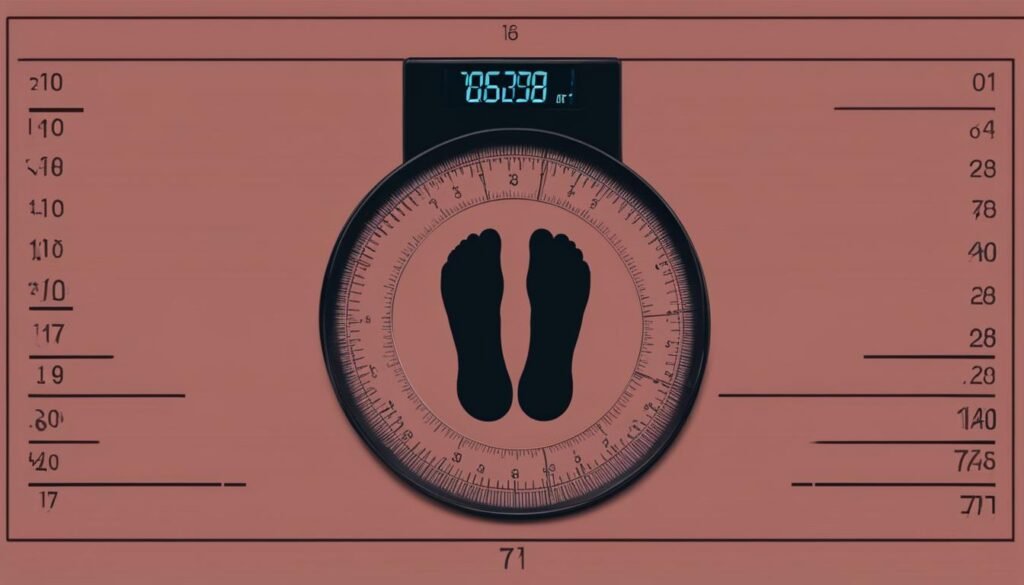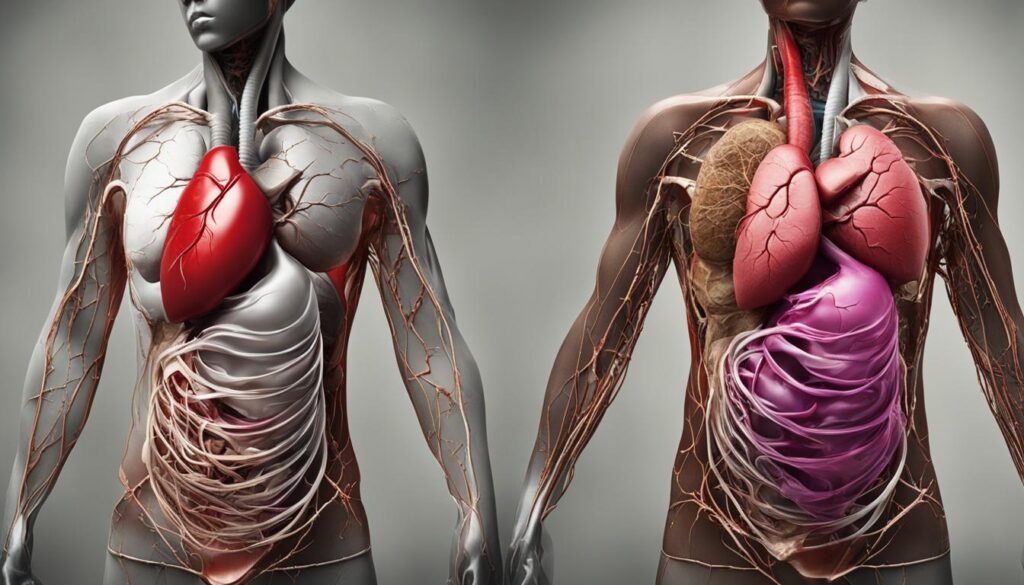Break the Stress and Weight Gain Cycle through effective stress management and weight management techniques. In today’s fast-paced world, stress has become a common companion, often leading to unhealthy behaviors and weight gain. Understanding the connection between stress and weight is crucial for maintaining a healthy lifestyle.
When stress takes hold, it can disrupt our eating habits, causing us to turn to food for comfort and satisfaction. Stress triggers the release of cortisol, a stress hormone that increases blood glucose levels and leads to sugar cravings. This can result in overeating and the accumulation of abdominal fat, making weight loss a challenging task.
To combat stress-induced weight gain, it’s essential to adopt a holistic approach. Incorporate stress reduction techniques into your daily routine, such as mindfulness, journaling, and exercise (check this post out). These activities can help alleviate stress, improve mental well-being, and promote healthier eating habits.
Self-care plays a crucial role in breaking the cycle of stress and weight gain. Prioritize self-care activities that nurture your body and mind. Engage in activities that bring you joy and relaxation, whether it’s taking a walk in nature, practicing yoga, or indulging in a hot bath.
By addressing stress and its impact on weight, you can regain control of your health and well-being. Implementing healthy lifestyle habits, seeking support, and recognizing the connection between stress and weight are key steps towards achieving a more balanced life.
Key Takeaways:
- Stress can significantly impact weight management and lead to weight gain.
- Mindfulness, journaling, and exercise are effective stress reduction techniques.
- Unhealthy behaviors, such as emotional eating and lack of exercise, are often caused by stress.
- Break the stress and weight gain cycle through self-care practices and healthier eating habits.
- Seeking professional help may be necessary for managing chronic stress and weight gain.
The Connection Between Stress and Weight Gain
Stress and weight gain have a strong connection, primarily influenced by the release of stress hormones, including cortisol. When stress levels rise, cortisol levels increase as well, leading to various metabolic changes that contribute to weight gain.
One significant effect of cortisol on weight gain is its impact on blood glucose levels. Cortisol prompts the liver to release glucose into the bloodstream, providing a quick burst of energy for fight-or-flight responses. However, this increase in blood glucose levels can result in intense sugar cravings.
Excessive sugar consumption, often triggered by stress-induced cortisol release, can lead to an accumulation of abdominal fat. This type of fat is particularly dangerous as it surrounds vital organs, increasing the risk of various health issues.
Cortisol also affects metabolism, slowing it down to conserve energy for times of stress. This slowdown makes it more challenging to lose weight and maintain a healthy metabolism.
A study conducted on stressed women found that they burned fewer calories and had higher insulin levels after consuming a high-fat, high-calorie meal. These findings indicate the disruptive effects of stress on metabolism and insulin regulation, further contributing to weight gain.
| Affected Factors | Effects on Weight Gain |
|---|---|
| Blood Glucose Levels | Promotes sugar cravings |
| Sugar Consumption | Leads to the accumulation of abdominal fat |
| Metabolism | Slows down, making weight loss difficult |
| Insulin Levels | Disrupts regulation and contributes to weight gain |
Understanding the connection between stress and weight gain is crucial in developing effective stress management strategies and implementing healthy lifestyle habits that can mitigate the impact of stress on weight.
Unhealthy Behaviors Caused by Stress

Stress can have a significant impact on our behaviors, often leading to unhealthy habits that can contribute to weight gain. When we’re stressed, we may find ourselves engaging in emotional eating, opting for fast food, skipping exercise, skipping meals, and sacrificing sleep. These behaviors can create a cycle that perpetuates stress and weight gain.
One common unhealthy behavior that arises from stress is emotional eating. This is when we turn to food as a way to cope with our emotions, seeking comfort or distraction. The foods typically chosen during these times are often high in calories and low in nutritional value.
Eating fast food is another behavior that can be triggered by stress. When we’re overwhelmed and pressed for time, fast food becomes a convenient option. Unfortunately, these meals are often high in unhealthy fats, sodium, and added sugars.
During stressful periods, lack of exercise may become a problem as well. We may feel too drained or overwhelmed to engage in physical activity, leading to a sedentary lifestyle. Additionally, stress can impact our motivation and energy levels, making it harder to establish and maintain an exercise routine.
Skipping meals may seem like a time-saving strategy when we’re stressed, but it can have negative consequences for our overall health and weight. Skipping meals can disrupt our metabolism, increase cravings, and lead to overeating later in the day.
Furthermore, stress often causes sleep deprivation. When we’re stressed, it’s common to experience difficulty falling asleep or staying asleep due to racing thoughts or anxiety. Lack of sleep can disrupt our hunger and satiety hormones, contributing to weight gain.
Strategies to Break the Stress and Weight Gain Cycle
To break the cycle of stress and weight gain, I prioritize making exercise a daily habit. Regular physical activity not only helps to burn calories but also reduces stress levels and boosts mood. Incorporating activities I enjoy, such as cycling, swimming, or yoga, makes exercise more enjoyable.
Another strategy I adopt is to eat healthier comfort foods. Instead of turning to sugary or high-fat snacks when stressed, I opt for nourishing options like fresh fruits, vegetables, whole grains, and lean proteins. These foods provide essential nutrients and energy without contributing to weight gain.
I practice mindful eating, which involves bringing awareness to my eating habits and being fully present during mealtimes. This allows me to listen to my body’s hunger and fullness cues, promoting a healthier relationship with food. By savoring each bite and paying attention to taste, texture, and satisfaction, I can make more nourishing choices.
A useful tool in my journey is keeping a food journal. Writing down what I eat and drink throughout the day helps me identify patterns and make better choices. It increases my accountability and provides insights into portion sizes and emotional triggers that may lead to stress eating.
Additionally, I make a conscious effort to drink more water. Staying hydrated is crucial for overall health and can also help control appetite. Often, we mistake thirst for hunger, leading to unnecessary snacking. By keeping a water bottle handy and aiming for at least 8 cups a day, I ensure proper hydration.
I incorporate stress-relief strategies into my daily routine. Deep breathing exercises, meditation, and engaging in hobbies or activities I enjoy help manage stress levels. Regular exercise not only aids weight management but also releases endorphins, which improve mood and reduce stress.
If stress and weight gain become overwhelming, it is essential to seek professional help. Cognitive-behavioral therapy (CBT) can be effective in addressing the underlying causes of stress and developing coping mechanisms. A qualified therapist can provide valuable guidance and support tailored to individual needs.
The Impact of Chronic Stress on Weight Gain

Chronic stress can have a significant impact on weight gain, leading to various physiological changes and imbalances in the body. These changes can disrupt cognitive processes, increase hunger hormones, and contribute to overeating. Hormonal and chemical imbalances can further exacerbate the issue, causing metabolic issues and an increase in abdominal fat. Additionally, chronic stress often leads to physical inactivity, creating a sedentary lifestyle that contributes to weight gain.
In response to chronic stress, the body releases the hormone cortisol, which can stimulate appetite and lead to cravings for high-calorie foods. This hormonal response, combined with the psychological effects of stress, often drives individuals to engage in overeating as a coping mechanism. Moreover, the prolonged activation of the stress response system can disrupt the normal regulation of appetite, causing individuals to lose their natural ability to regulate food intake.
The image below visually represents the impact of chronic stress on weight gain:
“Chronic stress can disrupt the body’s natural balance, leading to physiological changes that contribute to weight gain. By understanding the connection between stress and weight, we can develop strategies to address chronic stress and prevent the negative impacts it has on our health.”
The Role of Physiological Changes
Chronic stress triggers a cascade of physiological changes in the body, leading to weight gain. These changes include increased levels of stress hormones, such as cortisol, which can affect metabolism and promote fat storage, particularly in the abdominal area. Additionally, chronic stress can disrupt the balance of other hormones involved in appetite regulation, leading to an increase in hunger cravings and a preference for high-calorie foods.
The Impact on Cognitive Processes
Chronic stress can also impair cognitive processes related to decision-making and self-control. Research has shown that individuals under chronic stress are more likely to engage in impulsive behaviors, including overeating and making poor food choices. Moreover, stress can affect the brain’s reward system, making individuals more susceptible to food cravings and seeking temporary comfort in unhealthy eating habits.
Addressing Hormone and Chemical Imbalances
To combat the hormone and chemical imbalances caused by chronic stress, it is crucial to focus on implementing healthy lifestyle habits. Regular exercise, adequate sleep, and a balanced diet can help regulate hormone levels and promote overall well-being. Additionally, engaging in stress-reduction techniques, such as meditation and relaxation exercises, can help restore hormonal balance and reduce the risk of weight gain.
Breaking the Cycle of Overeating and Physical Inactivity
Breaking the cycle of overeating and physical inactivity requires a comprehensive approach. It’s important to address the root causes of chronic stress and develop coping strategies that don’t involve food. Engaging in regular physical activity, such as walking or yoga, can help reduce stress levels and enhance overall vitality. Incorporating mindful eating practices, such as paying attention to hunger and fullness cues, can also promote healthier eating habits.
By understanding the impact of chronic stress on weight gain and implementing lifestyle changes, individuals can take proactive steps towards managing stress, improving their overall well-being, and maintaining a healthy weight.
Recognizing the Risks of Stress and Weight Gain

Stress-related weight gain can have serious consequences on our overall health and well-being. Let’s take a closer look at the various risks associated with stress-induced weight gain:
The Physical Impact
High blood pressure, heart disease, and stroke are just a few of the physical health problems that can result from stress-related weight gain (see my post here). The excess weight puts additional strain on the cardiovascular system, increasing the risk of developing these conditions.
The impact of stress on weight gain also extends to metabolic health. The body’s ability to regulate blood sugar levels becomes compromised, leading to a higher risk of developing diabetes. Slow metabolism, often a result of chronic stress, can further contribute to weight gain and hinder weight loss efforts.
The Emotional Toll
Mental health issues such as anxiety and depression are closely linked to stress-induced weight gain. The continuous cycle of stress and weight gain can take a significant toll on one’s emotional well-being, leading to increased anxiety and feelings of sadness or hopelessness.
“Stress and weight gain not only impact our physical health, but they can also affect our mental and emotional well-being.”
Reproductive Problems and Joint Pain
In addition to the physical and mental consequences, stress-induced weight gain can affect reproductive health. Hormonal imbalances caused by stress can disrupt the menstrual cycle and contribute to infertility or complications during pregnancy.
The added weight strain on the joints can result in chronic joint pain and arthritis, making physical activity more challenging and further contributing to weight gain.
Recognizing these risks, it becomes crucial to address and manage stress-related weight gain to avoid the development or worsening of these health conditions.
| Health Risks | Description |
|---|---|
| High Blood Pressure | Elevated blood pressure increases the risk of heart disease and stroke. |
| Diabetes | Stress disrupts blood sugar regulation, increasing the risk of developing diabetes. |
| Heart Disease | Excess weight strains the cardiovascular system, leading to heart-related conditions. |
| Stroke | The increased risk of blood clots due to stress and weight gain can lead to strokes. |
| Reproductive Problems | Hormonal imbalances caused by stress can affect fertility and pregnancy. |
| Joint Pain | The added weight strain on joints can lead to chronic pain and arthritis. |
It’s essential to address stress, manage weight, and adopt healthy lifestyle habits to reduce the risk of these health complications. The next section will focus on strategies to break the cycle of stress and weight gain and promote overall well-being.
Diagnosis of Stress-Related Weight Gain

The diagnosis of stress-related weight gain involves ruling out other potential health issues that could contribute to weight gain. It is essential to conduct a thorough examination and review the individual’s medical history to determine if stress is the underlying cause of the weight gain.
During the diagnosis process, healthcare professionals may consider various factors and perform tests to rule out other health issues. For example, they may assess the individual’s thyroid function to exclude any thyroid problems, which can also lead to weight gain.
It is crucial to conduct a comprehensive evaluation to differentiate between stress-related weight gain and weight gain caused by other medical conditions.
Medical professionals will likely inquire about the individual’s stress levels and experiences, eating habits, exercise routine, and any other relevant factors. They may also order blood tests or other diagnostic procedures to gather additional information.
Once other potential health issues have been ruled out, and the individual’s symptoms align with stress-related weight gain, a confident diagnosis can be made. From there, appropriate strategies and interventions can be implemented to address both the stress and weight gain.
The Importance of Accurate Diagnosis
Accurately diagnosing stress-related weight gain is essential for determining the most effective treatment plan. Without a proper diagnosis, individuals may struggle to manage their weight and improve their overall well-being.
By ruling out other potential health issues and pinpointing stress as the primary factor contributing to weight gain, healthcare professionals can create tailored interventions and provide appropriate guidance. This targeted approach increases the likelihood of successful outcomes in managing stress and achieving sustainable weight loss.
Reducing Stress and Breaking the Cycle

When it comes to managing stress-related weight gain, implementing self-care strategies is crucial. By incorporating various practices into your daily routine, you can effectively reduce stress levels and prevent weight gain. Here are some stress reduction tips and self-care practices that can make a significant difference:
1. Engage in Physical Activity
Physical activity is not only beneficial for maintaining a healthy weight but also for reducing stress. Regular exercise releases endorphins, which are natural mood boosters. Aim for at least 30 minutes of moderate-intensity exercise, such as walking, jogging, or cycling, on most days of the week. Pairing physical activity with stress reduction techniques, such as deep breathing exercises or mindfulness, can enhance its positive effects on both body and mind.
2. Practice Healthy Eating Habits
Adopting a balanced and nutritious diet is essential for managing stress and preventing weight gain. Ensure that your meals consist of plenty of fruits, vegetables, lean proteins, and whole grains. Avoid relying on comfort foods that are high in sugar and unhealthy fats, as they can exacerbate stress and lead to weight gain. Incorporating stress-relieving foods, such as dark chocolate or herbal teas, can also help promote a sense of calm and well-being.
3. Cultivate Social Support
Having a strong support system is vital for stress management. Surround yourself with positive and understanding individuals who can offer emotional support during challenging times. Engage in meaningful social interactions and spend quality time with loved ones. Sharing your feelings and experiences with trusted friends or family members can help alleviate stress and prevent emotional eating or other unhealthy coping mechanisms.
4. Practice Mindfulness and Breathing Exercises
Mindfulness is a powerful tool for stress reduction. Take time each day to focus on the present moment, letting go of worries and negative thoughts. Incorporate breathing exercises into your routine, such as deep diaphragmatic breathing or progressive muscle relaxation. These techniques can activate the body’s relaxation response, promoting a sense of calm and reducing stress levels.
5. Prioritize Sleep Hygiene
Adequate sleep is essential for overall well-being and stress reduction. Establish a consistent sleep schedule and create a relaxing bedtime routine. Avoid stimulating activities, such as using electronic devices or consuming caffeine, close to bedtime. Create a comfortable sleep environment free from distractions. Quality sleep improves mood, cognitive function, and the body’s ability to manage stress effectively.
By implementing these stress reduction tips and self-care practices, you can break the cycle of stress-related weight gain and cultivate a healthier, more balanced life.
| Self-Care Strategies | Benefits |
|---|---|
| Engaging in physical activity | – Releases endorphins – Reduces stress – Helps maintain a healthy weight |
| Practicing healthy eating habits | – Provides proper nutrition – Prevents weight gain – Supports overall well-being |
| Cultivating social support | – Offers emotional comfort – Reduces feelings of isolation – Provides a sense of belonging |
| Practicing mindfulness and breathing exercises | – Promotes relaxation – Reduces stress and anxiety – Improves mental clarity |
| Prioritizing sleep hygiene | – Enhances overall well-being – Improves stress management – Supports healthy weight maintenance |
Treatment for Stress-Related Weight Gain

When it comes to managing stress-related weight gain, seeking appropriate treatment is crucial. A visit to your doctor is the first step in addressing your concerns and ruling out any underlying health issues. Through a comprehensive evaluation, your doctor can develop a personalized treatment plan tailored to your specific needs. This plan may include a combination of medical interventions, lifestyle modifications, and professional guidance from experts such as registered dietitians, psychologists, or therapists. In some cases, medication may be recommended to address chronic anxiety or depression that can contribute to weight gain.
Treatment for stress-related weight gain is a collaborative effort, involving the expertise and guidance of healthcare professionals. By working closely with your doctor and other experts, you can gain the necessary support and resources to overcome the challenges of stress-induced weight gain.
Medical Interventions
Depending on your individual circumstances, medical interventions may be recommended to address stress-related weight gain. These interventions can include medication options that target specific underlying factors contributing to weight gain, such as hormonal imbalances or metabolic issues. It’s important to consult with your doctor to determine the most appropriate medical interventions for your unique situation.
Lifestyle Modifications
Lifestyle modifications play a crucial role in managing stress-related weight gain. These modifications may involve implementing healthy dietary changes, engaging in regular physical activity, improving sleep hygiene, and practicing stress reduction techniques. By making sustainable lifestyle modifications, you can effectively manage stress levels and prevent further weight gain.
Working with a Registered Dietitian
A registered dietitian is a valuable ally in your journey to combat stress-related weight gain. They can provide you with personalized nutritional guidance and support, helping you make informed choices that promote a healthy weight. A registered dietitian can also help you develop an individualized meal plan that suits your specific needs and preferences while addressing stress-related factors that contribute to weight gain.
Seeing a Psychologist or Therapist
Addressing the psychological aspects of stress-related weight gain is an essential part of treatment. A psychologist or therapist can help you explore the underlying emotional and behavioral factors that may contribute to weight gain. Through various therapeutic techniques, they can assist you in developing coping strategies and stress management skills to break the cycle of stress-induced weight gain.
Fig 1: Seeking professional help is crucial in managing stress-related weight gain.
It’s important to remember that treatment for stress-related weight gain should be tailored to your specific needs and circumstances. The guidance of healthcare professionals can provide the necessary support and expertise to help you address the root causes of weight gain and develop effective strategies for long-term weight management.
The Outlook for Stress and Weight Gain

Chronic stress and weight gain can have serious long-term health consequences. The combination of these two factors can increase the risk of developing heart disease, digestive issues, high blood pressure, anxiety, depression, diabetes, stroke, and other chronic conditions. It is crucial to recognize the impact that chronic stress and weight gain can have on overall well-being.
However, there is hope. By implementing proper treatment and making necessary lifestyle modifications, individuals can effectively manage stress levels, maintain a healthy weight, and significantly reduce the risk of developing long-term health issues.
Long-term Health Consequences
| Health Condition | Description |
|---|---|
| Heart Disease | Chronic stress and weight gain increase the risk of developing heart disease, a leading cause of death worldwide. |
| Digestive Issues | The combination of stress and weight gain can lead to digestive problems such as irritable bowel syndrome (IBS) and acid reflux. |
| High Blood Pressure | Stress and weight gain can contribute to elevated blood pressure levels, increasing the risk of hypertension and cardiovascular complications. |
| Anxiety | Chronic stress and weight gain can worsen anxiety symptoms and impact overall mental well-being. |
| Depression | Stress and weight gain have been linked to the development and exacerbation of depressive symptoms. |
| Diabetes | Excessive weight gain and chronic stress can increase the risk of developing type 2 diabetes. |
| Stroke | Stress and weight gain contribute to stroke risk factors, such as high blood pressure and inflammation. |
| Chronic Conditions | The combination of chronic stress and weight gain can lead to the development of various chronic conditions, such as metabolic syndrome and arthritis. |
While the long-term consequences of stress and weight gain are significant, it’s important to remember that proactive measures can make a difference. By prioritizing stress reduction techniques, maintaining a healthy lifestyle, and seeking support when needed, individuals can minimize the risk of long-term health issues.
What Strategies Can Help Manage Stress-Induced Weight Gain in a High-Stress Job?
Managing stress-induced weight gain in a high-stress job involves navigating job stress and weight gain. Strategies may include incorporating regular exercise, practicing mindfulness and meditation, seeking social support, and maintaining a balanced diet. It’s important to prioritize self-care and make healthy choices to combat the impact of job stress on weight.
Conclusion
Stress-induced weight gain is a common issue that many individuals face. However, with the right strategies and a commitment to a healthy lifestyle, it is possible to manage and prevent weight gain caused by stress. By implementing stress reduction techniques, adopting healthy lifestyle habits, and seeking professional help when necessary, individuals can break the cycle of stress and weight gain and achieve a healthier and more balanced life.
Managing stress is key to preventing weight gain. Incorporating stress reduction techniques such as mindfulness, deep breathing exercises, and regular physical activity can help minimize the negative impact of stress on weight. Additionally, adopting a healthy lifestyle that includes nutritious eating habits, proper sleep hygiene, and social support can further contribute to weight management and overall well-being.
However, it is important to recognize that managing stress and weight gain may sometimes require professional assistance. If stress becomes overwhelming or leads to chronic anxiety or depression, seeking the guidance of a healthcare professional, registered dietitian, or therapist can provide the necessary support and guidance. Through a comprehensive approach that addresses both the physical and mental aspects of stress and weight gain, individuals can take control of their health and prevent the potential long-term consequences associated with these issues.




